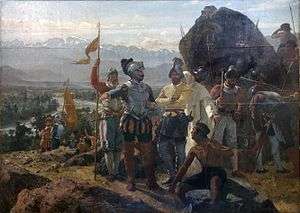Chile–Spain relations
 | |
Chile |
Spain |
|---|---|
Chile–Spain refers to the current and historical relations between Chile and Spain. Both nations are members of the Association of Spanish Language Academies, Organization of Ibero-American States and the Organisation for Economic Co-operation and Development.
History
Spanish colonization

In 1536, Spanish explorer Diego de Almagro arrived to present day Chile hoping to find another territory as rich as Peru, however, discovering no mineral resources in the territory, he soon returned to Peru.[1] In 1540, Spanish conquistador Pedro de Valdivia entered Chile and founded the city of Santiago. In 1553, during the Battle of Tucapel, Pedro de Valdivia was killed by Mapuche warriors.[1]
In 1542, Chile became part of the Spanish Empire and was governed by the Viceroyalty of Peru based in Lima. In 1776 the Viceroyalty of the Río de la Plata based in Buenos Aires was created and Chile was immediately administered by the new Viceroyalty.[1] Due to the lack of mineral wealth in the territory, very few Spanish migrants settled in Chile and those who did, mostly worked the land as farmers.
Independence
In the early 19th century, a wave of independence sentiment was rolling through the Spanish Empire in Latin America. On 18 September 1810, leaders of the Captaincy General of Chile declared Chile as an autonomous republic within the Spanish monarchy.[1] For the next decade, Chilean forces would battle Spanish troops for independence. In October 1814, Chilean troops lost during the Battle of Rancagua which led to the Reconquista of Chile by Spain from 1814-1817.[1]
In February 1817, troops led by General Bernardo O'Higgins, along with General José de San Martín and the Army of the Andes entered Chile from Argentina through the Andes and fought Spain in the Battle of Chacabuco which resulted in a Chilean/Argentine victory. In April 1818, O'Higgins and San Martín's forces fought Spanish troops led by General Mariano Osorio at the Battle of Maipú which secured Chile's and Argentina's independence.[1]
Post independence

In April 1844, Spain recognized Chile's independence and both nations formally established diplomatic relations after the signing of a Treaty of Peace and Friendship.[2] In March 1866, during the Chincha Islands War, Spain bombarded the Chilean port of Valparaíso in retaliation for Chile's participation in the war and for refusing Spanish ships to dock at Chilean ports.[3]
During the Spanish Civil War (1936-1939), Chilean Nobel Prize winner, Pablo Neruda was stationed as consul in Madrid. Neruda witnessed first hand the battles and wrote about it in his book titled España en el corazón.[4] In 1939, Neruda was appointed consul in Paris for Spanish Emigration to Chile.[5] In Paris, with the support of the Chilean government, Neruda arranged for a ship called the SS Winnipeg to carry 2,200 Spanish migrants, many of them communist and Republicans, to Chile.[6] After the war, in April 1939, Chile recognized the government of Francisco Franco.[7]
From 1970 - 1973, relations between the government of socialist Salvador Allende and anti-communist Francisco Franco were friendly and in 1972, Franco invited Allende to visit Spain, however, Allende refused the offer.[8] Soon after the 1973 Chilean coup d'état which saw the removal (and suicide) of Salvador Allende; Franco recognized the government of Augusto Pinochet. In November 1975, Franco died and Pinochet was the only foreign head of state to attend his funeral.[9]
In March 1990, Pinochet transferred power to the newly elected President Patricio Aylwin and in October 1990, Spanish King Juan Carlos I paid his first official visit to Chile.[10] The King would visit Chile on several occasions afterwards.
There are currently 60,000 Spanish nationals residing in Chile.[11] There are direct flights between both nations with the following airlines: Iberia, LATAM Chile and Plus Ultra Líneas Aéreas.
Bilateral relations
Over the years, both nations have signed numerous agreements such as an Agreement on Social Security (1998); Memorandum on Scientific and Technological cooperation (2003); Air transportation agreement (2007); Security agreement (2014) and an Agreement on Tourism (2015).[12]
Trade
In 2015, trade between Chile and Spain totaled €2.7 billion Euros.[12] In 2014, Spanish investments in Chile totaled $3.2 billion USD.[12] Spanish multinational companies such as Banco Bilbao Vizcaya Argentaria, Banco Santander, Mapfre and Zara, among others, operate in Chile. Several brands of Chilean wine can be found throughout Spain.
Resident diplomatic missions
- Chile has an embassy in Madrid and a consulate-general in Barcelona.[13]
- Spain has an embassy in Santiago.[14]
_01.jpg) Embassy of Chile in Madrid
Embassy of Chile in Madrid Consulate-General of Chile in Barcelona
Consulate-General of Chile in Barcelona- Embassy of Spain in Santiago
See also
References
- 1 2 3 4 5 6 Encyclopedia Britannica: Chile
- ↑ Tratado de Paz y Amistad entre España y la República Chilena (in Spanish)
- ↑ Ruptura y Reconciliación: España y el Reconocimiento de las Independecias Latinoamericanas (in Spanish)
- ↑ España en el corazón de Pablo Neruda: el «paraíso perdido» (in Spanish)
- ↑ Pablo Neruda - Biographical
- ↑ Guerra Civil española. Pablo Neruda y el Winnipeg, el barco de la esperanza (in Spanish)
- ↑ Chile y la Guerra (in Spanish)
- ↑ Una insólita amistad (in Spanish)
- ↑ The Dictator
- ↑ Don Juan Carlos afirma que no visitó antes Chile por su régimen autoritario (in Spanish)
- ↑ Bilateral Relations (in Spanish)
- 1 2 3 Spanish Ministry or Foreign Affairs: Chile (in Spanish)
- ↑ Embassy of Chile in Madrid (in Spanish)
- ↑ Embassy of Spain in Santiago (in Spanish)

.svg.png)